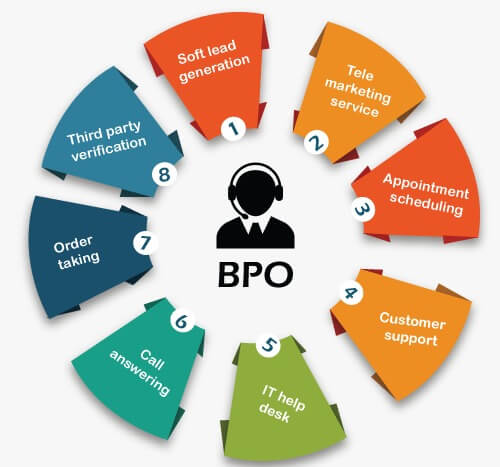Full Form of BPO
BPO FULL FORM
BPO stands for Business Process Outsourcing. This is a hiring process in which an organization hires a company to perform a particular task that the organization requires to operate its own business without any hurdle.
BPO's roots are spread to the manufacturing industry also. With these manufacturers, the company controls the specific processes which are other than the core competencies that are required to make the end products. This specific process includes the handling of the supply chain.

USES OF BPO
The two main reasons behind the interest of organizations in BPO are as follows:
- Back Office Operations: These operations are also known as internal business functions. These functions include information technology (IT) services, quality assurance (QA), accounting, payment processing, and human resource (HR).
- Front Office Operations: These operations include sales, grievances redressal, marketing, and customer relations.
Mostly an organization takes one or more outsource services together. For example, the organization can outsource just the payroll process instead of outsourcing all the functions of HR.

BPO WORKING PROCESS
As per the advice of some management experts, first of all, the organization must identify the functions that are to be outsourced, and then proper evaluation of those functions, including their pros and cons of outsourcing, should be done. This all will help in whether the task that is going to be outsourced makes strategic sense for the organization or not. If the answer is yes, then the organization must identify the best service provider and shift the task from the inner house to that BPO company.
Here is the need for proper change management while outsourcing as the movement affects staff, established processes, and existing workflows. When work or function is shifted from the internal staff to the outside service provider, then also arise the cost for the organization by taxes and reporting expenses.
For a smooth flow of work between the organization and the BPO company, the organization may also need to invest in technology solutions. Here the scope of the function that is to be outsourced decides the cost of that technology solution.
SCOPE OF WORK IN BPO
An organization must collect the information about the scope of work that the organization is shifting from the inner staff to the external partner at the time when the organization signs a contract with the outsourced provider. The impact on the flow of work and processes by its shift to the external partner must be identified by the executives.
The main objectives of outsourcing a function should also be identified by the executives. These objectives can be better quality, cost savings, quicker turnaround, or some other. On the basis of these criteria, the organization should determine which provider would be the best to handle a particular function. These objectives are the basis for contractual obligations. These obligations are helpful in providing the success of functions and assessing the performance of the outsourced provider.

TYPES OF BPO
There are a lot of BPO companies around the world that provide outsourcing services. As per the location of the service provider, a BPO can be divided into three main categories which are:
- Offshore Outsourcing: When an organization demands outsourcing services from a company that operates in a foreign country, then it is called offshore outsourcing or just offshoring.
- Onshore Outsourcing: When outsourcing services are taken by an organization from the company located in the same country, it is called onshore outsourcing. It is also known as domestic outsourcing.
- Nearshore Outsourcing: When an organization takes the outsourced services from a BPO company located in a neighboring country, it is called nearshore outsourcing.
BENEFITS OF BPO
Some of the most interesting benefits of BPO are as follows:
- Lower Cost: This is the most important benefit of the BPO. Because of the lower costs, the organizations prefer outsourcing. It helps in reducing the overhead costs or the company’s expenses on IT equipment and a large number of employees to perform different tasks as the company can outsource the tasks to a service provider.
- Higher Efficiency: The efficiency level of the BPO companies is very high as the employees are experienced in different work fields and can easily perform different tasks. The latest technology and the best practices are adopted by these companies that increase productivity and result in higher efficiency.
- Global Expansion: If an organization wants to expand its business at the global level or in an overseas market, then a BPO company can be helpful to complete this task. During the expansion, a company requires knowledge of the local market, fluency in a foreign language, and national law expertise. A BPO helps in performing all these activities efficiently.
- Focus on Core Business Function: A company can focus on the core business function or the main activity by transferring the non-core activities to a BPO company. This is helpful mainly for the startups as they encounter a difficult market condition.
DRAWBACKS OF BPO
In spite of the benefits that are given above, the BPO has some disadvantages or drawbacks, also which affects its efficiency and reliability. These drawbacks are:
- Security Issues: While taking an outsourcing service, you have to share your sensitive data with a BPO company. In this case, this affects the security issues of the organization and can cause a security breach.
- Communication Problems: The language barrier may be a hurdle in efficiency while working with an offshore BPO company. The problem of miscommunication can easily happen in BPO companies, especially those who are providing development or IT services. This miscommunication may lead to a big mistake, and sometimes this mistake can be very costly.
- Unforeseen Costs: Sometimes, the costs of the work may be higher than expected. This happens because of the underestimation of the quantity of work as the work is not so hard and fast in these organizations. Also, due to an unexpected delay in the delivery of work, the indirect costs may increase, and in case of a dispute with a BPO company, the charge of legal expenses can arise.
- Over Dependency on Companies: If the organization takes the services through outsourcing for a long period, then the organization can become overly dependent on the BPO company. It may lead to their arbitrary while deciding the prices, and they may demand a higher cost.
RPO, KPO, AND LPO
BPO can also be categorized on the basis of the services that they provide. There are three such categories of BPO:
- Knowledge Process Outsourcing (KPO): This BPO company performs not just its particular business functions but also the service of expertise around it.
- Research Process Outsourcing (RPO): This is a type of KPO that provides the service of research and analysis functions. Biotech companies, marketing agencies, and investment firms are some examples of organizations that provide these services.
- Legal Process Outsourcing (LPO): LPO helps in performing all the legal services like drafting a legal document and performing legal research. It is also a type of KPO.
BPO MARKET SIZE
As per the estimated report of BPO Services Global Industry Almanac 2017, the size of the worldwide BPO market was about US$140 billion in 2016, which grows up to US$144.9 billion in 2017 with a Compound Annual Growth Rate (CAGR) of 3.3%. Among the major powerhouse of the industry, India, China, and the Philippines are at the top.
According to a report of the National Industry Association, the revenue generated by the BPO industry in India was about US$30 billion in 2017. But with respect to the total outsourcing industry, the BPO industry is just a small segment of it. This segment may shrink by 14% in 2021.
In the Philippines, the BPO industry generated US$22.9 billion in 2016. As per some sources, by 2022, the industry will create about 700 thousand medium and high skill jobs in the country.
FUTURE DIRECTIONS
In upcoming years the service may be partially displaced by the technology. Some of the tasks can be handled by Robotic Process Automation (RPA) and Artificial Intelligence (AI). These tasks can be performed at a lower cost and higher speed by using these technologies. But all processes can not be easily automated by a BPO. A service provider may be in a better position to utilize those technologies to automate its service offerings than organizations are. In this way, it helps the BPO provider to retain its appeal of looking for the most appropriate way of handling business functions to the organization.
CONTROVERSIES AROUND BPO
In a competitive digital economy that operates 24/7, the practice of outsourcing services is believed a critical component of organizational success by many business leaders. This makes the practice controversial over the years.
As per the opinion of some labor leaders, politicians and workers, the BPO is encouraging organizations to shift good jobs from their own country to the countries where the labor laws and environmental protections are less stringent along with low-wage laborers. In the past, this criticism has been fueled outrage among the people against outsourcing. For example, in 2015, many technology workers were laid off by Disney, but they first had to train their foreign-based replacements.